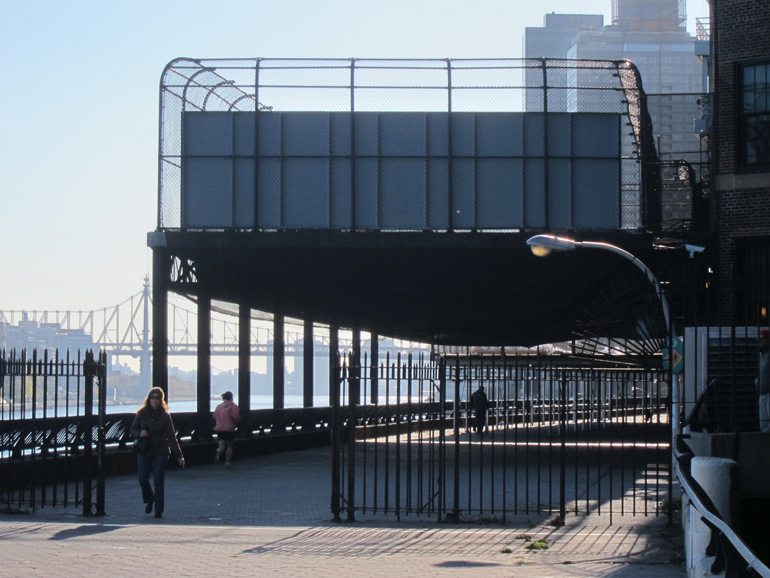Gotham Diary:
Spinach
14 November 2012
Forgive my silence yesterday. I had absolutely nothing to say that anyone would want to read. Not until after dinner, that is; and I’ve learned not to write after dinner. I spent the day in a valley of bones, very tired but otherwise not uncomfortable unless I thought about myself. I had a few moments of wondering if I would find the energy to clean up, dress, and go to the hospital, but once I began that process, about an hour before the infusion, the blackest doubts came to an end. It was bitter outside, and I was grateful not to have to wait too long for a taxi. As we made our way down York Avenue, I looked up at the cluster of hospital towers and felt completely mortal. And when I arrived at the Infusion Therapy Unit, there were no familiar faces, not at first. It turned out that Sara was on duty; a very pleasant Irishwoman, she is the only nurse to have served on the unit’s staff throughout the eight-plus years that I’ve been a patient there. She had me hooked up in no time. For the first hour, I read the new New Yorker. For the second, I turned to Susan Reynolds’s Fiefs and Vassals, which I am going to re-read cover to cover. On the phone, Kathleen proposed to pick me up when the infusion was over, and I accepted with tickled delight; it would be her first visit to the Unit, and, in the event, she got to meet Sara, which was very agreeable. We walked around a few corners to a restaurant called Petaluma and had a very nice dinner, hugely entertained by the buzz coming from the glassed-off private dining room, where a speed-dating event was in progress. I know that we looked at each other with the deepest relief: that’s not how we met. This thought, carrying me back over thirty-five years, ought to have made me feel mortal, too, but it didn’t.
Regular readers will not be surprised to learn that a major ingredient of my pre-infusion depressions is anxiety about actually getting the infusion. I have never not, but there have been hiccups — most recently last spring, when a bit of careless potting-up, involving potting soil taken from a bag that had been lying on the balcony, opened, resulted in bug bites that the nurses found so alarming that they insisted that my rheumatologist have a look first. In the early days, it used to take quite a while for my blood pressure to drop to acceptable levels, a vicious circle as I sat in my chair, fretting. On one occasion, there was some confusion about the dosage. It is all rather like air turbulence during flight — uncommon but frightening. In any case, these worries evaporate once the pump is turned on, and I begin to feel better at once, long before the Remicade can have any actual physiological impact. By the time we were seated at the restaurant, I was cheerful again.
The evening was crowned by a most unexpected pleasure. A novelist with whom I have been in correspondence wrote to report his interest in what I’ve had to say here about Elizabeth Taylor. He had read five of the novels, he wrote, liking two but not caring so much for the others, and he asked for a recommendation for what to read next. This was doubly delightful, because (a) a novelist! and (b) Elizabeth Taylor! I will strain to keep my reply under a thousand words.
***
Susan Reynolds argues that what we think of as “feudalism,” with knights swearing oaths of fealty to kings and potentates, is a construct of Renaissance scholarship that corresponds only squintingly to the very unsystematic arrangements reflected by actual records surviving from the post-Carolingian world. “What the concept of feudalism seems to have done since the sixteenth century is not to help us recognize the creatures we meet but to tell us that all medieval creatures are the same so that we need not bother to look at them. Put another way, feudalism has provided a kind of protective lens through which it has seemed prudent to view the otherwise dazzling oddities and varieties of medieval creatures.”
Putting down that lens is what Reynolds’s book is all about and, as such, it is in keeping with the best intellectual efforts of our time, which strive to correct for the bland complaisance with which thinkers of the modern era minimized the difficulties of research and discovery. Victorian optimism has finally been laid to rest, and what concerns us is not so much exercising our mastery as examining our restraints. We dismiss the know-it-all as a useless fraud; we seek out the interestingly uncertain. The frank confession of ignorance and the reluctance to to build on generalizations are the hallmarks of intellectual decency. For the time being.

